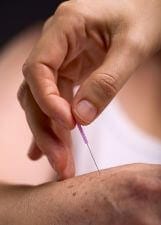Dementia is a cognitive impairment that can occur with certain diseases. It affects memory, thinking, language, judgment, and behavior. Most types of Dementia are degenerative, meaning they are nonreversible. Alzheimer’s disease is the most common type of Dementia, but there are many forms this impairment can take. Some of the most common conditions that can lead to Dementia include Lewy Body Disease, Huntington’s Disease, Multiple Sclerosis, Parkinson’s Disease, brain tumors, chronic alcohol abuse, brain injury, and strokes (which lead to vascular dementia).
Common Symptoms and Traditional Chinese Medicine Treatments
In addition to memory loss, there are several common symptoms that accompany Dementia. Change in sleep patterns, often waking up at night, forgetting details about current events, depression, agitation, or withdrawing from social contact are common side effects of this condition. Traditional Chinese medicine can help to treat a variety of the discomforts associated with Dementia. From acupuncture to herbal remedies, Chinese medicine practitioners have provided treatments for many of these situations for over two thousand years.
Acupuncture’s Role in Treating Dementia-Related Symptoms
Acupuncture has shown promising results to treat the depression and anxiety associated with Dementia, as well as to increase patient’s verbal and motor skills and to increase cognitive function. Two well known studies on the matter came out of Wellesley College Center for Research on Women and the University of Hong Kong. These studies, among others, were first presented at the World Alzheimer’s Conference in Washington, D.C.
In the Wellesley study, Dr. Nancy Emerson Lombardo and a team of colleagues at Wellesley College in Massachuestts studied 11 patients, 10 with Alzheimer’s and one with vascular dementia. Subjects were treated with acupuncture twice a week for three months, with each subject receiving a minimum of 22 treatments. Patients were subjected to a variety of tests before and after being treated, including the Cornell Scale for Depression, the Speilberger State Anxiety Inventory, and the Mini-Mental Status Exam (MMSE) for cognitive function.
Results and Observations from Key Studies
The results stated “statistically significant improvements” in the depression and anxiety scores of patients. For example, the average Spielberger anxiety score at the start of treatment was 49.5; at the end of three months, it had decreased to 40.1. Four subjects experienced “substantial improvement” in mood symptoms after undergoing acupuncture; of those whose moods improved, two also showed improved MMSE scores, and a third improved in tests for fluency and naming ability.
While cognitive function was not measured scientifically (no control group was used), Lombardo said that those delivering treatment seemed to note an improvement in their subjects’ thinking skills along with the other improvements, which she believes indicates a close relationship between cognitive ability, anxiety and depression.
If you think a career in holistic medicine is something you would like to pursue, contact us and speak to an admissions representative to get started on your new journey!
Herbal Remedies in Traditional Chinese Medicine for Dementia
Herbology is another component of traditional Chinese medicine (TCM). A TCM practitioner will prescribe an herbal remedy specific to the patient-there is no “one size fits all” remedy in TCM. So, two patients who both have dementia and seek Chinese herbs could be prescribed very different mixtures. However, there are several Chinese herbs that are well known for their ability to assist in cognitive function and prevent memory loss. Ginkgo biloba (Ginkgoaceae) is an ancient Chinese tree that has been cultivated and held sacred for its health-promoting properties. There is substantial experimental evidence to support the view that the leaf extract of Ginkgo biloba (EGb) has many pharmacological effects including helping the mind stay sharp, and strengthening memory. Radix Ginseng is Chinese herb that has been used since ancient times for neurological benefits. Its active compounds, including total ginsenosides, ginsenoside Rg1, and panaxynol, were found to possess central cholinomimetic and catecholaminomimetic activity, and can help balance the central nervous system as well as promote neuronal plasticity and neurogenesis (the birth of new neurons, which is crucial for learning and memory). Another such herb is Danshen Root, which can inhibit inflammation in the brain.
The Benefits of Massage in Managing Dementia Symptoms
Lastly, there is evidence that massage can help manage symptoms associated with Dementia such as anxiety, agitation and depression. Asian bodywork massage techniques such as Tui Na or Shiatsu can target specific areas that hold tension (like the neck and shoulders), and employ acupoints, the same points used in acupuncture, to help stimulate specific organs or parts of the body. The healing power of touch that massage provides can help reduce insomnia, increase rest, and relieve fears and anxiety. Traditional Chinese medicine has many modalities to choose from, all of which can provide a safe and natural accompaniment to other contemporary Western Dementia treatments.
Sources
Acupuncture Today
Pub Med Central
Alzheimer’s Society
Dementia Care News
Featured Posts:

